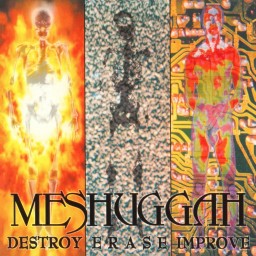 Review by Rexorcist for Meshuggah - Destroy Erase Improve (1995)
Review by Rexorcist for Meshuggah - Destroy Erase Improve (1995)
I admit that, even as a prog fan, I never really held djent in the highest respect. Not that I don't judge the albums fairly, but I never have the highest expectations for djent considering that it turned one of the world's most innovative music genres into a monotone mess full of would-be innovators that need to resort to grindcore and other like genres to have some sort of edge over Meshuggah. This is because Meshuggah, who invented the "genre" brought some sort of class to it on the first ever djent album: Destroy Erase Improve.
Out intro alone, Future Breed Machine gives us this Voivod-noise atmosphere while the band effortlessly takes us through thrash, industrial, and some weird Cthulhu shit that all feels natural because Meshuggah have their own fairly unique tone. And you really have to appreciate some of their weirder timing techniques, molding 120 BPM drums with 180 BPM guitar riffs like it's nothing, and when it's not thrashing its riffing with the same kind of energy displayed by some of the best guitarists in metal. Soul Burn is one of the slower songs on the album, being more groove that thrash, and it pulls many of these tricks with perfect personality mingling with a healthy sense of art. And this djent album also leaves some room to just thrash out, like with the shorter song Transfixion. And while Vanish combines thrash with djent, its behavior in heaviness and structure is a more akin to death at times.
You may notie that I only covered the first half, well that pretty much shows you what we're dealing with. Side B starts us off with a calmer electric guitar instrumental that us soak in the vibes while we cool ourselves off after such menacing examples of Meshuggah's power. And it does a pretty good job at it (although it doesn't match some of the segues in Issues). The problem here is, after the sixth track, it largely runs out of freah ideas. I mean, unlike Hetfield in Ride the Lightning and Majewski in Butcher the Weak or Jax Coleman in Extremities, our singer here is mostly just shouting the same way usually does. And on top of that, all the ideas that were present on the first five tracks are pretty much repeated, so the variety suffers a little bit. But overall, the album still builds itself on its strengths while largely justifying the flaw. There's no denying that Meshuggah were a very creative band at one point, and they've managed to maintain their rep in the music industry. However, it would be nice to see them try to reack the creative hieghts of Destroy Erase Improve instead of just trying to maintain their djent rep.
